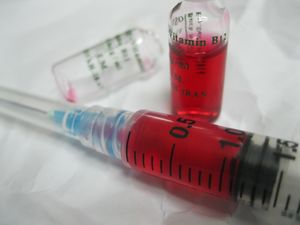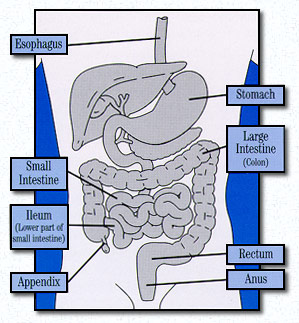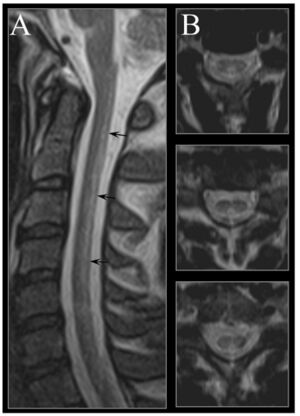Vitamin B12 Deficiency
Original Editors -Aneta Petri & Katie Wilson as part of the Bellarmine University's Pathophysiology of Complex Patient Problems project.
Top Contributors - Aneta Petri, Kathrine Wilson, Lucinda hampton, Kim Jackson, Elaine Lonnemann, Vidya Acharya, 127.0.0.1, Wendy Walker, WikiSysop, Lauren Lopez and Ahmed M Diab
Introduction[edit | edit source]
Vitamin B12 deficiency is one of the most prevalent nutritional deficiencies. It causes a range of symptoms, eg fatigue, forgetfulness, and tingling of the hands and feet.
The reason for the wide variety of symptoms is that vitamin B12 plays a principal role in numerous body functions eg
- Essential for DNA synthesis. DNA (central information storage system of most animals, plants, and even some viruses), directs proper formation of every part of the body. [1]
- Vitamin B12 deficiency increases homocysteine levels (normally degraded by vitimain B 12) which causes inflammation and toxic damage to the body. Elevated homocysteine increases your risks for dementia, heart disease and stroke, as it .[2]
Vitamin B12 Uptake[edit | edit source]
Vitamin B12 is bound to protein in food and must be released before it is absorbed. The process starts in the mouth when food is mixed with saliva. The freed vitamin B12 then binds with haptocorrin (protects acid sensitive B12 as it moves through the stomach). In the duodenum, digestive enzymes free the vitamin B12 from haptocorrin, and this freed vitamin B12 combines with intrinsic factor, a transport and delivery binding protein secreted by the stomach’s parietal (lining) cells. The resulting complex is absorbed in the distal ileum by receptor-mediated endocytosis. If vitamin B12 is added to fortified foods and dietary supplements, it is already in free form and therefore does not require the separation step[3].
Etiology[edit | edit source]
Causes of vitamin B12 deficiency include:
- Difficulty absorbing vitamin B12 from food, eg any patient with a history of gastric bypass surgery may be at risk; surgical resection terminal ileum due to eg Crohn's disease; damage to the small intestine, eg inflammation from celiac disease or infection with the tapeworm.
- Autoimmune: Pernicious anemia is an autoimmune condition in which antibodies to intrinsic factor are produced. Anti-intrinsic factor antibodies bind to and inhibit the effects of intrinsic factor, resulting in an inability of B12 to be absorbed by the terminal ileum.
- Prolonged use of certain medications e.g. metformin, proton pump inhibitors.
- Dietary Insufficiency: Vitamin B12 is stored in excess in the liver; however, patients who have followed a strict vegan diet for approximately three years may develop a B12 deficiency from a lack of dietary intake[3].
Risk Factors[edit | edit source]
The following groups are among those most likely to be vitamin B12 deficient.
- Older adults: Between 3% and 43% of community-dwelling older adults, especially those with atrophic gastritis (an autoimmune condition) have vitamin B12 deficiency.
- Conditions associated with vitamin B12 inadequacy include: pernicious anemia; Atrophic gastritis, affects 8–9% of adults aged 65 and older; Helicobacter pylori infection, inflammation leads to malabsorption of vitamin B12 from food.
- Individuals with gastrointestinal disorders or who have had gastrointestinal surgery
- Vegetarians and Infants of vegan women
The below video gives a good summary of the condition
Characteristics/Clinical Presentation[edit | edit source]
The most common sign of vitamin B12 deficiency is Fatigue. This is caused by the lack of red blood cells to carry oxygen to body tissue.
Lack of red blood cells may also cause:
- Weakness
- Shortness of breath
- Dizziness
- Headache
- Coldness in your hands and feet,
- Pale or yellowish skin
- Chest pain
- Sensory and Motor Impairments
- Loss of appetite and Weight loss
- Loss of Balance
- Depression and Confusion
- Poor Memory
- Dementia or Cognitive changes
- Soreness of mouth [5][6]
Treatment[edit | edit source]
Vitamin B12 deficiency can be managed with supplemental B12. This could be an oral supplement or an injection. If B12 deficiency is caused by a problem with absorption, an injection of B12 will help the vitamin to be absorbed directly into the body.
Some patients need lifelong B12 supplementation. This usually depends on the cause of the deficiency, possibly with the need to continue taking B12 supplements even after symptoms have improved.
Recovery from vitamin B12 deficiency takes time. Improvement may be gradual and may continue for up to six to 12 months[2].
Systemic Involvement[edit | edit source]
Vitamin B12 deficiency can cause haematologic, neurologic, gastrointestinal, and cardiovascular symptoms.
- Haematologic - Hematologic pathology may cause the following symptoms: skin pallor, weakness, fatigue, syncope, shortness of breath, and palpitations.
- Neurological - The most common neurological symptom is tingling in the hands and feet. Other possible neurological symptoms that could occur: paresthesia, weakness, motor deficits, loss of vision, behavioural changes, and cognitive changes.
- Gastrointestinal - Gastrointestinal dysfunction can cause symptoms such as anorexia, flatulence, diarrhoea, and constipation.
- Cardiovascular - Vitamin B12 deficiency can lead to increased risk of coronary artery disease and stroke. Vitamin B12 deficiency causes hyperhomocysteinemia which can increase occlusions in the vascular system. There is not a lot of evidence to prove that vitamin B12 will cause vascular issues, but the evidence does link the two together. [7]
Physical Therapy Management[edit | edit source]
An individual with a confirmed or suspected Vitamin B12 deficiency is typically treated by a primary physician with mediation that includes intramuscular injection, oral Vitamin B12 supplements, or through a change in nutritional habits. Treating or diagnosing a patient with a vitamin deficiency typically falls outside of the Physical Therapist Scope of Practice, however physical therapists should be aware of the presenting sign and symptoms of Vitamin B12 deficiency and refer to proper medical personnel with any unusual findings. Physical Therapists should be particularly familiar with the role Vitamin B12 on the nervous system.
- If a physical therapist suspects that a Vitamin B12 deficiency may be present they should refer to MD.
- Early diagnosis of the deficiency is extremely important because the effect of treatments is believed to be linked to the time of diagnosis[8].
Vitamin B12 and the Nervous System[edit | edit source]
Vitamin B12 acts as a co-enzyme that facilitates myelin synthesis. A defect in the myelin synthesis can lead to both central and peripheral nerve function abnormalities. Some conditions seen with this dysfunction include: myelopathy, neuropathy and optic nerve atrophy. Roughly 25% of individuals suffering from a vitamin B12 deficiency experience peripheral neuropathy.
The spinal cord can become involved in severe deficiency and a syndrome often seen with this is sub-acute combined degeneration (SCD). MRI findings may reveal an inflammation of the spinal cord, most commonly reported at the T2 level. [8]Clinical presentations of SCD include[8] [9]
- Bilateral sensory deficits most commonly affecting bilateral lower extremities
- Bilateral lower extremity weakness
- Ataxia
- Decreased proprioception and vibration sensation
- Positive Rombergs Sign
- Abnormal reflexes
- Spastic paresis
For an image of MRI showing image of see SCD:
Dietary Management [edit | edit source]
The most common way to treat vitamin B12 deficiency alternatively is through increasing dietary intake.
Vitamin B12 is a nutrient that is only found in animal products such as meat, chicken, fish, eggs, and dairy. Therefore vegans are at especially high risk of low nutritional vitamin B12, as are non-vegan individuals who do not eat enough of these vitamin B12 rich foods.
Some foods are fortified with vitamin B12, vegans have to make an effort to seek out those types of foods.[2]
Food Sources containing vitamin B12, in descending order
| Food and Serving Size | Micrograms (mcg)
Per Serving/Percent of Daily Values |
|---|---|
| Clams, cooked, 3 ounces
Liver, beef, cooked, 3 ounces Breakfast cereals, fortified with 100% of the DV for vitamin B12, 1 serving Trout, rainbow, wild, cooked, 3 ounces Salmon, sockeye, cooked, 3 ounces Trout, rainbow, farmed, cooked, 3 ounces Tuna fish, light, canned in water, 3 ounces Cheeseburger, double patty and bun, 1 sandwich Haddock, cooked, 3 ounces Breakfast cereals, fortified with 25% of the DV for vitamin B12, 1 serving Beef, top sirloin, broiled, 3 ounces Yogurt, fruit, low-fat, 8 ounces Cheese, Swiss, 1 ounce Beef taco, 1 soft taco Ham, cured, roasted, 3 ounces Egg, whole, hard boiled, 1 large Chicken, breast meat, roasted, 3 ounces |
84.1/ 1,40
70.7 /1,178 2.5/ 42 2.1 /35 1.5 /25 1.4 /23 1.2/ 18 1.1 /18 0.9 /15 0.9/ 15 0.6 /10 0.6 /10 0.3/ 5 [6] |
References[edit | edit source]
- ↑ Allen LH. Vitamin b-12. Advances in Nutrition. 2012 Jan;3(1):54-5. [1]
- ↑ 2.0 2.1 2.2 Very well health How Vitamin B12 Deficiency Affects the Body Available: https://www.verywellfit.com/causes-and-effects-of-vitamin-b12-deficiency-4126428(accessed 12.4.2022)
- ↑ 3.0 3.1 NIH Vit B 12 Available:https://ods.od.nih.gov/factsheets/VitaminB12-HealthProfessional/ (accessed 12.4.2022)
- ↑ Healthline 5 signs and symptoms of vitamin B 12 deficiency. Available from: https://www.youtube.com/watch?v=i3A7PLhrDck (last accessed 15.5.2019)
- ↑ Nation Institutes of Health Pernicious Anemia Available at:http://www.nhlbi.nih.gov/health/health-topics/topics/prnanmia/.
- ↑ 6.0 6.1 National Institutes of Health Vitamin B12 Available at http://ods.od.nih.gov/factsheets/VitaminB12-HealthProfessional/#h5.
- ↑ Center of Disease control Vitamin B12 Deficiency . Available at:http://www.cdc.gov/ncbddd/b12/intro.html. (last accessed 16.5.2019)
- ↑ 8.0 8.1 8.2 Adami F, Binotto G, Briani C et al. Cobalamin Deficiency: Clinical Picture and Radiological Findings. Nutrients. 2013 Nov 15 . Available from PubMed: http://www.ncbi.nlm.nih.gov/pmc/articles/PMC3847746/
- ↑ Leishear K et al. The Relationship of Vitamin B12 and Sensory and Motor Peripheral Nerve Function in Older Adults. J Am Geriatr Soc. 2012 June;60(6): 1057–1063.










